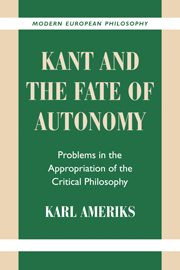Book contents
8 - The Unresolved Fate of Autonomy
Published online by Cambridge University Press: 05 June 2012
Summary
In these final very brief remarks, I will not be adding any significant new historical details, or trying to sum up all the main points covered so far. Instead, I will attempt merely to provide a final perspective on this study as a whole, so as to forestall some understandable possible misunderstandings of its basic objectives and underlying contentions.
This study began with a reminder of Kant's own sharp public repudiation in 1798 of his first successors. Kant himself could not have known or foreseen the details that I have uncovered in examining the main stages in the later development in German idealism. But Kant was certainly familiar with his own philosophy, and he was expressly disinclined to follow the route of the Elementarphilosophie of Reinhold or what he could make out of the Wissenschaftslehre of Fichte. Most interpreters would surely agree that, if he had the chance, Kant would have also kept a similar distance from Hegel. I have offered an extended argument about why Kant would have been right to do so, since on my account there is a basic structure to Kant's philosophy that undergoes significant modification in Reinhold's work, and these modifications then determine, albeit in a now largely forgotten way, major features and corresponding weaknesses in the better-known systems of both Fichte and Hegel. But my account can hardly claim to be an exhaustive study of the issue.
- Type
- Chapter
- Information
- Kant and the Fate of AutonomyProblems in the Appropriation of the Critical Philosophy, pp. 338 - 344Publisher: Cambridge University PressPrint publication year: 2000



